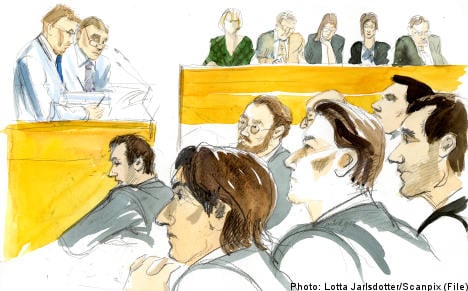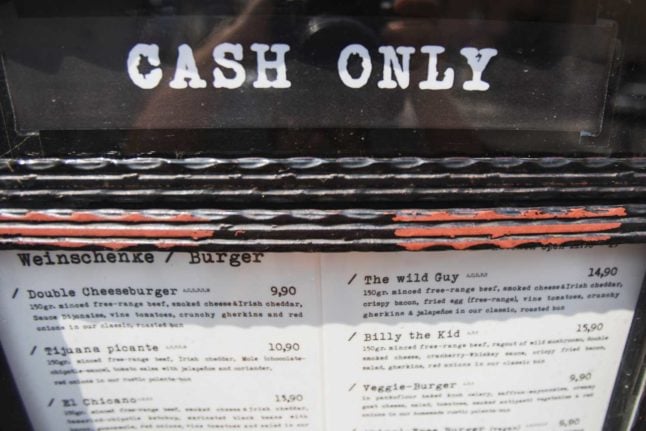“The act is without parallel in Sweden’s history,” district prosecutor Leif Görts told the court as he argued for the maximum sentence of ten years in prison for five of the suspects, each charged with aggravated theft.
“If there is any instance when one should use the maximum penalty, this is it.”
The sabotage of the police helicopter hangar and the blocking off of city street around the case depot are, according to the prosecutor, important parts of the robbery.
Therefore he argued that those accused of those crimes to be sentences as if they had participated in the robbery itself.
The robbery should be considered aggravated for several reasons, including the “military” style planning, the sabotage against the police, the threats made against employees at the depot, as well as the use of weapons and explosives.
“Simply choosing a helicopter shows that they assumed that in Sweden they wouldn’t be shot down,” said Görts.
Five other men are charged with aiding and abetting.
Görts divided the defendants into two groups: the accused whose evidence stands on its own merit and those where the evidence is dependent on the evidence against the other defendants.
“I believe that the court will see that the question of guilt depends on how one views the evidence against the others,” he said.
According to Görts, the strength of the evidence stems from a combination of the contacts that existed between the people involved in the robbery’s “preparation group”, forensic evidence, as well with direct links between the defendants.
A forgotten receipt, which according to the prosecutor was probably left in a trunk, tied a 32-year-old man to a number of mobile phones that he purchased.
According to Görts, the mobile phones show that the suspects intended to dodge police wiretaps and that they used them to commit crimes. He added that it was clear that several contacts were established between the man and the 38-year-old “brain” behind the raid.
“They have a lot to do with each other,” he said.
“They said they are friends and that is how they met, but they also said that they had a land deal together.”
The prosecution said that an accused 35-year-old, known as “the pilot,” was involved in planning in early stages as evidenced by telephone calls.
“We understand that he was involved at an early stage when they tried to recruit a pilot from Serbia,” Görts said.
“He was an important link to get a helicopter, which was not easy.”
The man was linked to the heist through traces of DNA. A GPS used in the robbery was examined and tracked the trail of “the pilot.”
The pilot said the GPS trail came from other means. A trace of DNA was also found on the cable ties, which the prosecutor argued were used to fasten the ladder used during the robbery.
The prosecution believes it has proved that the 32-year-old man purchased the mobile phones, represented those who planned the robbery, and paid an advance to the pilot, who was recruited in Serbia.
The man maintained contact with the “brain” of the operation, who in turn had contact with the man in Serbia, known as “Stockholm’s gangster king.”
The evidence against the Serbian man consists of telecommunications records in Sweden and Serbia and bugging carried out after Swedish police received tips from colleagues in Serbia.
District prosecutor Björn Frithiof said the “brain” discussed the recruitment of a helicopter pilot from Serbia in preparation for the robbery. The man said in a late stage of the investigation that they had made use of a crane operator on a construction job.
Görts argued that several people were involved in sabotaging the police’s helicopter hangar. By placing several dummy bombs in the hangar, police response was significantly delayed.
Separately, DNA from a 24-year-old suspect was found on a lighter. The Swedish National Laboratory of Forensic Science (Statens kriminaltekniska laboratorium, SKL) said that there is very little chance that it belongs to someone else.
In addition, the prosecution pointed to a number of circumstances that night that it considered suspect, including the man getting rid of a phone because he did not want to risk getting caught.
The spectacular heist took place on September 23rd. A helicopter was stolen and landed on the roof of security company G4S’ cash depot in Västberga in southern Stockholm. Three armed men broke a window on the roof, blew up several doors and entered the rooms where large amounts of cash were stored.
The thieves escaped in the helicopter, which was later found in Skavlöten north of Stockholm. Over 39 million kronor ($5.37 million) was stolen, of which only a fraction has since been recovered.



 Please whitelist us to continue reading.
Please whitelist us to continue reading.
Member comments